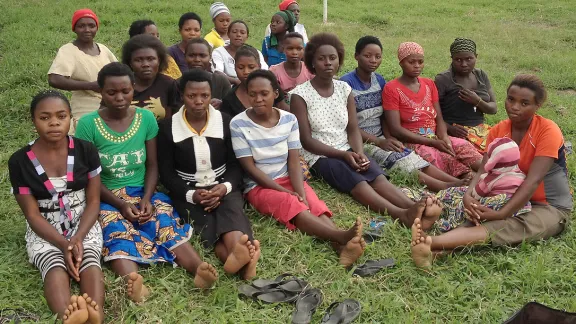
Young women in Rwamwanja settlement were one of the focal groups in the consultations. Photo: LWF/ S. Oftadeh
(LWI) - Gender-based violence and poor access to education are among the major human rights challenges for refugees in south western Uganda. That was made clear during a Universal Periodic Review (UPR) workshop at the end of 2015 for local staff and partners of The Lutheran World Federation (LWF) working in the region.
The UPR process is a unique mechanism of the UN Human Rights Council aimed at improving the human rights situation on the ground in each of the 193 UN member states. The mechanism is used to review the human rights situation of all UN member states every 4.5 years.
In the process, non-governmental organizations are encouraged to submit their findings in first hand reports, so-called parallel reports, which members can consider when presenting recommendations to the country under review. As part of a national Civil Society Stakeholders Forum in Uganda preparing a parallel report to the Office of the United Nations High Commissioner for Human Rights (OHCHR), LWF is leading a cluster of groups on the rights of refugees, migrants and post-conflict communities.
As a first step of the consultation with communities, LWF is training local staff in refugee settlements. During the workshop for staff working in the Rwamwanja refugee settlement, participants focused on the main human rights issues affecting refugees in the settlement and how to ensure their concerns are brought to the attention of the international community and the Ugandan government through the UPR process.
“Perpetrators not prosecuted properly”
The Rwamwanja refugee settlement is home to more than 50,000 refugees from the Democratic Republic of the Congo (DRC). Refugees and local host communities were interviewed in different focal groups divided by gender and personal situation.
Women refugees in the settlement identified gender-based violence, caused mainly by strong belief in traditional norms and practices, and poor access to education as major human rights challenges. The LWF country program in Uganda provides community-based volunteer groups with information and skills to raise awareness about child protection and sexual and gender-based violence.
“Violence against women and rape still happens a lot in the settlement and the perpetrators are not prosecuted properly,” a woman named Laetitia says. Often, evidence gets lost on the way or victims are afraid of reporting to the authorities. Refugees have no trust in the police and the official system in the settlement, she adds. “Girls are especially vulnerable. They are raped and don’t say anything about it,” her neighbor Roussi explains. “When they become pregnant, they try to abort the child.” Traditional structures often create additional risk for the women after the crime itself, as the victims of sexual assaults get blamed by the family.
Men and women alike cited the lack of vocational training opportunities in the Rwamwanja settlement and the long distances children have to walk to school as issues of concern. Even when children are able to attend school, there are sometimes as many as 200 pupils in a single class, which has a serious impact on the quality of education.
Besides gender-based violence and education, one of the main issues mentioned was access to land. Like in many other refugee settlements, disputes over land and access to resources also create tensions among refugees and hosts, intimidation and protection issues.
The LWF Advocacy Officer in Kampala has been conducting similar UPR workshops in the Adjumani settlement and the districts of Pader and Kitgum in northern Uganda, which are recovering from conflict.
The UN Human Rights Council reviewed Uganda for the first time in October 2011 and the country is set to be reviewed for its second time in October 2016.
A contribution by Saname Oftadeh and Moyette Marrett/LWF


